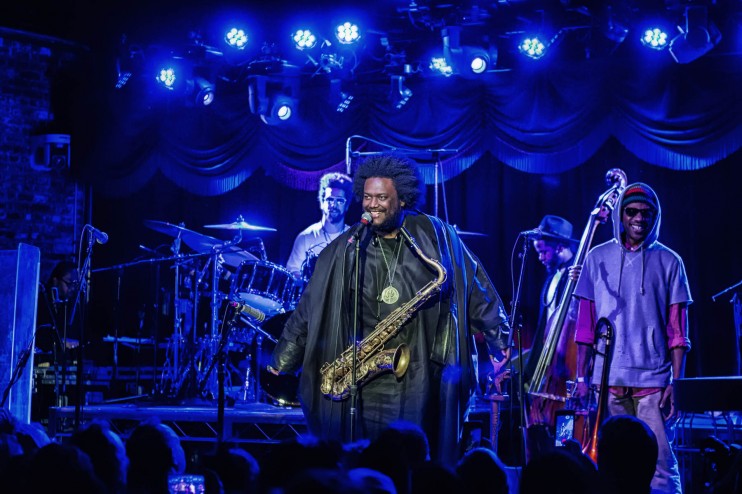Kamasi Washington at Brooklyn Bowl

The past year for Kamasi Washington might have been arguably the biggest year for any jazz musician in the 21st century. Building up an ever-more devoted following on the strength of his 2015 triple-album debut, The Epic, the saxophonist spent most of the year touring around the world, helping to introduce jazz to a new generation in the process. To close things out for 2016, Washington and his always stellar band The Next Step brought things to New York for a two night New Year’s Eve run at Brooklyn Bowl that proved a fitting cap for a tumultuous year.
While he’s no newcomer to the world of music, it wasn’t until he became known for his work on Kendrick Lamar’s magnum opus To Pimp a Butterfly that Kamasi started to receive acclaim from a wider audience. While much of jazz music today seems to get stuck in a world separated from pop music, those lines are beginning to blur and Kamasi Washington is the one leading the charge. His live shows thrive on a propulsive energy that feels unlike most other modern jazz artists, and is more akin to a group like The Allman Brothers Band circa At Fillmore East. Combining that energy with a visceral intensity that clearly draws from Washington’s hip-hop background (in addition to his work with Lamar, he’s toured with Snoop Dogg and worked with Lauryn Hill) is what gives his shows their edge, showing the world not just that jazz can be relevant, but why it should be relevant.
After a masterful opening set from The Budos Band, who got the crowd ready to dance and made sure to give out plenty of beer to members of the audience, Kamasi and co. took the stage to a room already buzzing with anticipation. “We here in Brooklyn, baby” Washington crooned as the band picked up a groove that carried them into the first tune of the night. The songs took a back seat to the immense chemistry and virtuosity of the band, with solos traded between Washington, keyboardist Brandon Coleman, and trombonist Ryan Porter leaving many in the crowd with their jaws on the floor. The funky “Giant Feelings,” one of Coleman’s tunes, which Washington introduced as one of his favorite songs ever, gave vocalist Patrice Quinn her first opportunity to impose her overwhelming soul on the Brooklyn audience before Coleman let loose yet another mind-bending solo. These musicians weren’t playing for people to lose themselves; every note and rhythm felt as though it was headed towards something, and each solo built to one dramatic climax after another, and the audience was along for the ride, matching the energy of the music with every twist and turn.
After bringing his father, Rickey Washington, to the stage, Kamasi gave Quinn yet another turn up at the microphone for the slow building “Henrietta Our Hero,” a tune written for and dedicated to Kamasi’s grandmother. Bassist Ben Williams, a frequent collaborator of jazz guitarist Pat Metheny filling in for usual Next Step bass player Miles Mosley, delivered a notable solo which stayed away from the experimental avenues usually explored by Mosley in favor of a more traditional but nonetheless stunning musical assault. Following a demonstration of the chemistry between the group’s two drummers, Ronald Bruner Jr. and Tony Austin, with a duet/drum-off between them, the band bid the crowd adieu with a performance of “Malcolm’s Theme,” which features lyrics transcribed from a eulogy delivered at the funeral of Malcolm X by Ossie Davis. As the musical tension rose and rose with the song’s simple melody and the ever-more-wild solos of the instrumentalists, a gut-wrenching scream from Patrice Quinn truly set things loose, with Kamasi’s soaring and screeching saxophone work embodying pain, loss, and hope all at once. There is probably no mix of emotions more suitable to the end of 2016 than that.



















